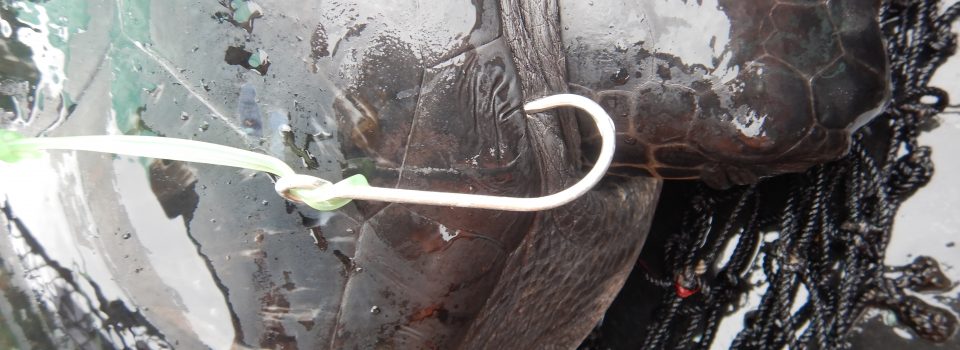Resultados del Proyecto Bi-Nacional “Reducir la captura incidental de las tortugas baulas en las pesquerías de palangre del norte de Chile” son expuestos en Taller de Difusión
julio 18th, 2023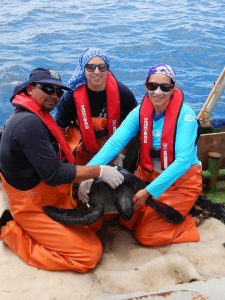 Las investigadoras del proyecto Seguimiento Recursos Altamente Migratorios, Enfoque Ecosistémico (SRAM ECO) del Departamento de Oceanografía y Medio Ambiente del Instituto de Fomento Pesquero, presentaron los resultados del proyecto binacional “Reducir la captura incidental de las tortugas baulas en las pesquerías de palangre del norte de Chile”.
Las investigadoras del proyecto Seguimiento Recursos Altamente Migratorios, Enfoque Ecosistémico (SRAM ECO) del Departamento de Oceanografía y Medio Ambiente del Instituto de Fomento Pesquero, presentaron los resultados del proyecto binacional “Reducir la captura incidental de las tortugas baulas en las pesquerías de palangre del norte de Chile”.
El taller tuvo lugar en el Auditorio Ana Ávalos Valenzuela del Museo de Historia Natural de Valparaíso y la audiencia estuvo conformada por la Subsecretaría de Pesca y Acuicultura, Ministerio de Relaciones Exteriores, la Dirección de Intereses Marítimos y Medio Ambiente (DIRINMAR), Universidad de Valparaíso y la Universidad de San Francisco State University.
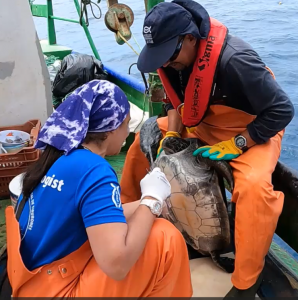 La Dra. Patricia Zárate, líder del proyecto SRAM ECO indicó que “este proyecto fue ejecutado por IFOP en Chile, en conjunto con la Fundación MarViva (Costa Rica) y financiado por el National Fish and Wildlife Foundation de Estados Unidos. Las principales actividades realizadas tuvieron relación con la experimentación de medidas de mitigación en 6 viajes de pesca en el norte de Chile y la capacitación de 114 pescadores y 37 funcionarios del sector público-privado, sobre la correcta manipulación y liberación de tortugas marinas”.
La Dra. Patricia Zárate, líder del proyecto SRAM ECO indicó que “este proyecto fue ejecutado por IFOP en Chile, en conjunto con la Fundación MarViva (Costa Rica) y financiado por el National Fish and Wildlife Foundation de Estados Unidos. Las principales actividades realizadas tuvieron relación con la experimentación de medidas de mitigación en 6 viajes de pesca en el norte de Chile y la capacitación de 114 pescadores y 37 funcionarios del sector público-privado, sobre la correcta manipulación y liberación de tortugas marinas”.
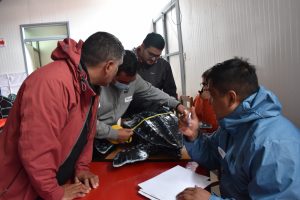 La Dra. Zárate agregó, las tortugas marinas se enganchan en los anzuelos, a veces de manera superficial ocasionando poco daño y una fácil liberación, pero también suelen engancharse en sitios más delicados, como los ojos y en ocasiones, las tortugas también se los tragan al morder la carnada, lo que puede ocasionar daños internos que podrían resultar fatales. En este proyecto, nos enfocamos en evaluar el uso de un anzuelo circular, distinto del anzuelo tipo jota que se usa en la pesquería artesanal de espinel para dorado de altura en el norte de Chile. Este anzuelo circular había demostrado tener éxito en otros países de la región al disminuir la captura incidental de tortugas marinas ya que, por su forma circular, los enganches son más superficiales y son más difíciles de tragar. Nuestros resultados demostraron que, las tortugas marinas efectivamente se enganchaban menos en este anzuelo, pero el mismo efecto fue observado en los dorados de altura, lo que no es un buen resultado para los pescadores que extraen dicho recurso. Una medida de mitigación apropiada para su implementación, debe estar diseñada para reducir la captura incidental de especies no objetivo sin incrementar la mortalidad en otros grupos, pero a la vez mantener la cantidad y calidad de las capturas de las especies objetivo”.
La Dra. Zárate agregó, las tortugas marinas se enganchan en los anzuelos, a veces de manera superficial ocasionando poco daño y una fácil liberación, pero también suelen engancharse en sitios más delicados, como los ojos y en ocasiones, las tortugas también se los tragan al morder la carnada, lo que puede ocasionar daños internos que podrían resultar fatales. En este proyecto, nos enfocamos en evaluar el uso de un anzuelo circular, distinto del anzuelo tipo jota que se usa en la pesquería artesanal de espinel para dorado de altura en el norte de Chile. Este anzuelo circular había demostrado tener éxito en otros países de la región al disminuir la captura incidental de tortugas marinas ya que, por su forma circular, los enganches son más superficiales y son más difíciles de tragar. Nuestros resultados demostraron que, las tortugas marinas efectivamente se enganchaban menos en este anzuelo, pero el mismo efecto fue observado en los dorados de altura, lo que no es un buen resultado para los pescadores que extraen dicho recurso. Una medida de mitigación apropiada para su implementación, debe estar diseñada para reducir la captura incidental de especies no objetivo sin incrementar la mortalidad en otros grupos, pero a la vez mantener la cantidad y calidad de las capturas de las especies objetivo”.
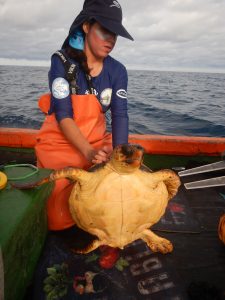 La investigadora M.Sc Ilia Cari añadió “los participantes de los talleres sintieron que sus opiniones, intereses y conocimiento tradicional fueron considerados en los talleres participativos, resaltando su interés por continuar con este tipo de instancias o iniciativas a lo menos una vez al año. Un aspecto clave fue considerar la diversidad de actores, incluyendo pescadores de distinto rango etario y con distintas funciones, tales como tripulantes, capitanes y armadores. Contar con la participación de invitados internacionales, pertenecientes al Sistema Nacional de áreas de Conservación y Ministerio de Ambiente de Costa Rica (Rotney Piedra) y la Gerente de Ciencias de Fundación MarViva (Cristina Sánchez) y de ACOREMA en Perú (Elizabeth Gutiérrez) quienes expusieron ante los pescadores la relevancia que tienen las acciones que estos puedan realizar con las tortugas marinas en Chile para conservar a las subpoblaciones del Pacífico Oriental, fue relevante para muchos pescadores, al darle importancia a las acciones que puedan ejecutar en altamar y para el oficio de la pesca artesanal”. El número de pescadores capacitados en estos talleres representan un bajo porcentaje de las flotas pesqueras que capturan incidentalmente tortugas marinas, por lo cual es necesario continuar con estas capacitaciones tanto al sector pesquero artesanal e industrial, como a funcionarios del sector público privado en Chile.
La investigadora M.Sc Ilia Cari añadió “los participantes de los talleres sintieron que sus opiniones, intereses y conocimiento tradicional fueron considerados en los talleres participativos, resaltando su interés por continuar con este tipo de instancias o iniciativas a lo menos una vez al año. Un aspecto clave fue considerar la diversidad de actores, incluyendo pescadores de distinto rango etario y con distintas funciones, tales como tripulantes, capitanes y armadores. Contar con la participación de invitados internacionales, pertenecientes al Sistema Nacional de áreas de Conservación y Ministerio de Ambiente de Costa Rica (Rotney Piedra) y la Gerente de Ciencias de Fundación MarViva (Cristina Sánchez) y de ACOREMA en Perú (Elizabeth Gutiérrez) quienes expusieron ante los pescadores la relevancia que tienen las acciones que estos puedan realizar con las tortugas marinas en Chile para conservar a las subpoblaciones del Pacífico Oriental, fue relevante para muchos pescadores, al darle importancia a las acciones que puedan ejecutar en altamar y para el oficio de la pesca artesanal”. El número de pescadores capacitados en estos talleres representan un bajo porcentaje de las flotas pesqueras que capturan incidentalmente tortugas marinas, por lo cual es necesario continuar con estas capacitaciones tanto al sector pesquero artesanal e industrial, como a funcionarios del sector público privado en Chile.
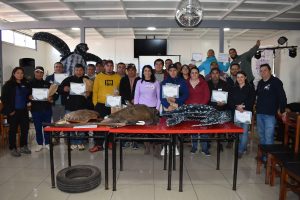 Este proyecto, de aproximadamente 3 años, ha permitido evaluar una medida de mitigación para reducir la captura incidental de tortugas marinas en la pesquería de dorado de altura en la zona norte, generar capacidades locales para reducir la captura incidental de tortuga marinas en Chile y ha facilitado la colaboración regional para mejorar la conservación y manejo de la tortuga laúd en el Océano Pacífico Oriental.
Este proyecto, de aproximadamente 3 años, ha permitido evaluar una medida de mitigación para reducir la captura incidental de tortugas marinas en la pesquería de dorado de altura en la zona norte, generar capacidades locales para reducir la captura incidental de tortuga marinas en Chile y ha facilitado la colaboración regional para mejorar la conservación y manejo de la tortuga laúd en el Océano Pacífico Oriental.
En la prensa:
industriaspesqueras.com
